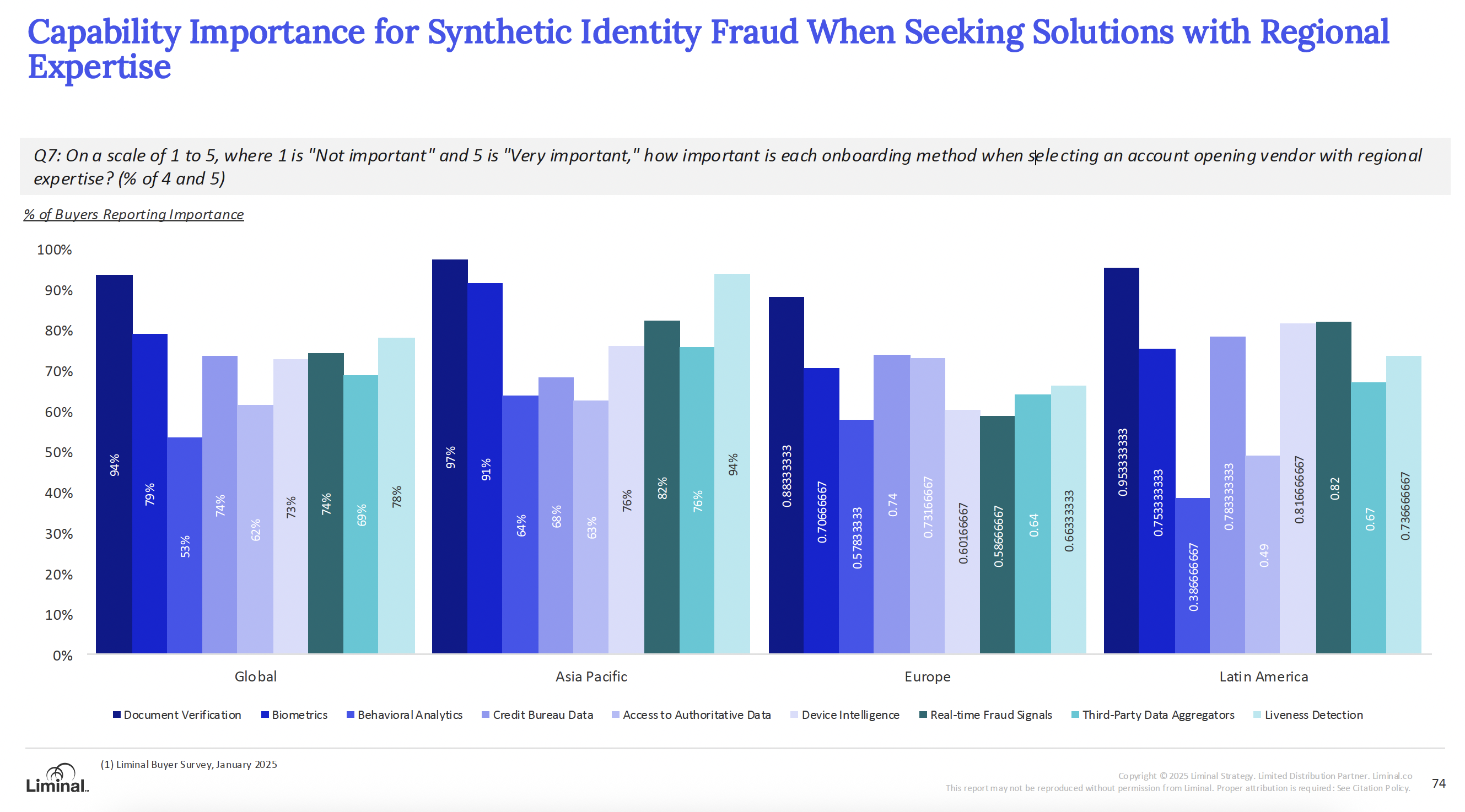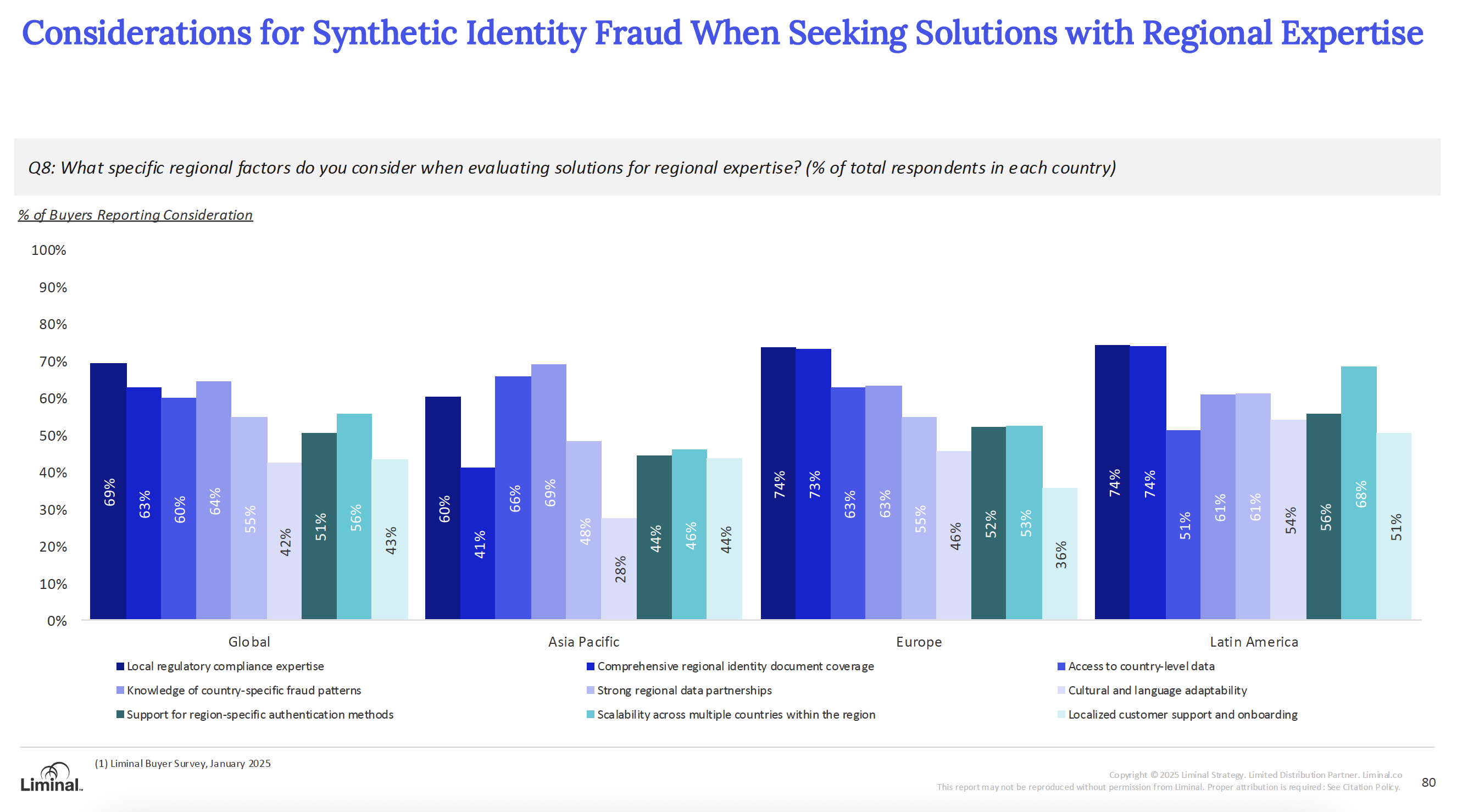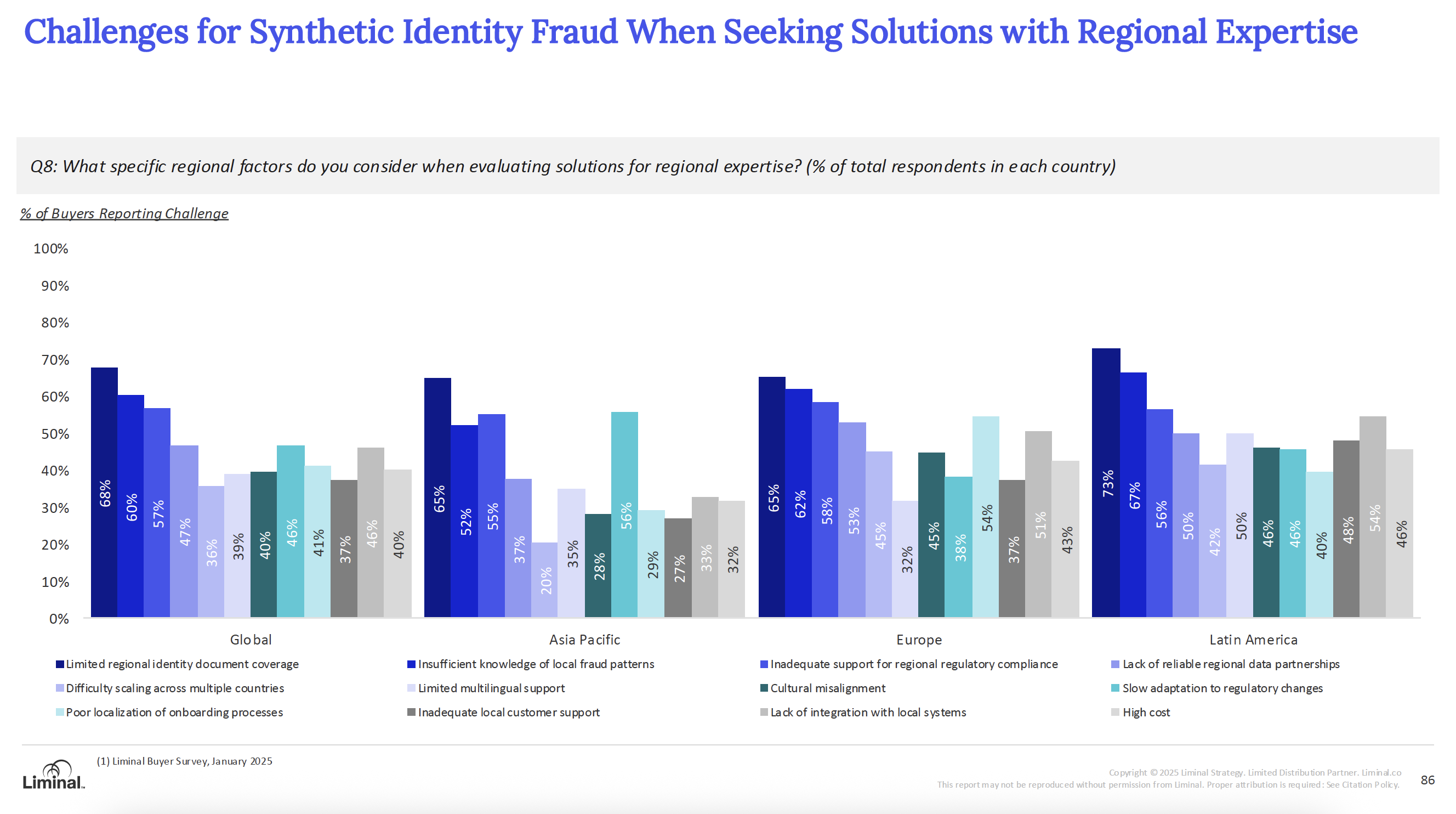Across the globe, fraud is rising rapidly, costing organizations hundreds of billions of dollars in fraud-related losses. The introduction of generative AI tools has been a major accelerant, increasing the volume and sophistication of fraud that enterprises face. AI-enabled fraud dominates today’s discussions, creating gaps in solution providers’ defenses as schemes evolve, leaving buyers vulnerable.
In particular, AI has led to exponential increases in synthetic identity fraud, where fraudsters create a fake identity using a blend of authentic and fabricated information. Unlike traditional identity fraud, where a real person’s identity is stolen, synthetic identity fraud uses a mix of information to create an identity that looks real on paper but does not actually exist. AI tools have made it easier than ever to create convincing synthetic identities that are difficult for traditional fraud prevention systems to detect.
To effectively combat the threat of synthetic identity fraud, it’s important to examine both the challenges organizations are facing, and regional breakdowns to find how enterprises in different geographies can best protect themselves.
Challenges With Existing Solutions
A recent Liminal report, Solving Advanced Fraud in Account Opening, commissioned by Data Zoo, found that 49% of buyers are facing challenges preventing synthetic identity fraud. In fact, more organizations are struggling to prevent synthetic identity fraud than any other type of fraud, including application fraud, money muling, and know your customer (KYC).
The widespread challenge of preventing synthetic identity fraud makes it clear that existing fraud prevention solutions are falling short. The Liminal report identified several key areas that these solutions struggle with:
Data Accessibility and Quality: Challenges with real-time access, data diversity, and integration create barriers to effective fraud prevention. 59% of buyers surveyed cited lack of real-time data access as a challenge, and 56% struggle with limited access to diverse data.
Analytical Capabilities: Weak analytics, static methods, and scalability issues limit the ability to detect and respond to fraud. 46% of respondents reported having insufficient behavioral intelligence tools and 38% identified an over-reliance on static methods.
Network Limitations & Market Expertise: Gaps in fraud consortiums, with 46% of buyers reporting limited participation in fraud consortiums, and insufficient cross-border verification reduce the effectiveness of collective defenses.
Together, the lack of quality data, substandard analytical capabilities, and limited regional expertise create significant pain points for organizations as they attempt to clamp down on synthetic identity fraud. Taking a closer, region-specific look at the capabilities, considerations, and challenges buyers have in mind when evaluating fraud prevention solutions is vital for understanding how to stop synthetic identity fraud.
Regional Breakdown: Capabilities and Considerations for Evaluating New Solutions
Across regions, several key trends emerge when exploring the capabilities and considerations enterprises are looking for to prevent synthetic identity fraud. Document verification and biometrics rate as the two most important onboarding capabilities buyers value when selecting an account opening vendor, according to the Liminal report.
Access to high-quality data is of critical importance for buyers as well: more than 60% of buyers globally named access to authoritative data as an important capability for a new fraud prevention solution. Authoritative data access is particularly crucial in Europe and APAC, where 73% and 63% of buyers, respectively, selected it as an essential capability.

Buyers also showcased a strong desire for regional expertise when asked about specific factors they consider when evaluating solutions. Local regulatory compliance expertise and knowledge of country-specific fraud patterns are the two most common considerations buyers said they look for.
Local expertise is especially important in Europe and Latin America, where more than 70% of respondents on both continents said they consider it a key factor when evaluating fraud-prevention solutions. Knowledge of country-specific fraud patterns was named an important consideration by more than 60% of respondents across Europe, Latin America, and APAC.

Organizations also echoed their concerns about data access and document coverage when listing their key considerations. Comprehensive regional identity document coverage, access to country-level data, and strong regional data partnerships rounded out the top five most important considerations for buyers across the globe.
Taken together, it’s clear that buyers value strong document verification tools, robust data, and extensive regional expertise when evaluating new fraud prevention systems. It’s no surprise, then, that these factors mirror the challenges they face in preventing synthetic identity fraud.
Regional Breakdown: Challenges in Combating Synthetic Identity Fraud
When looking at the challenges buyers are navigating in combating synthetic identity fraud, local and regional expertise emerges as a critical factor once again.
The Liminal report shows that regional identity document coverage and insufficient knowledge of local fraud patterns are the two most pressing challenges buyers face as they try to prevent synthetic identity fraud. In fact, those ranked as the two most common challenges across every region surveyed: Europe, APAC, and Latin America.
The importance of strong regional data shines through when reviewing the challenges buyers are facing as well. Nearly 50% of all respondents indicated that a lack of reliable regional data partnerships is a key challenge for them, making it among the most common challenges buyers are currently dealing with. European organizations find a lack of reliable regional data partnerships to be particularly troublesome, as 53% of respondents from the region named this a challenge.

The challenges buyers are facing make it apparent that, in order to more effectively combat the rising threat of synthetic identity fraud, modern fraud prevention solutions must use authoritative data to account for regional differences and specificities. Organizations across the globe are indicating an urgent demand for more adaptive, robust, and innovative security solutions.
High-Quality Data is the Key to Preventing Synthetic Identity Fraud
High-quality, authoritative data with regional expertise that compliments document verification tools, biometric solutions, and orchestration platforms are a priority for organizations in their efforts to slow synthetic fraud. As the Liminal report makes clear, buyers across the globe need strong, region-specific data from their synthetic fraud prevention solutions.
Leading account opening solutions leverage a combination of data, computer technology (such as biometrics and document verification), and predictive modeling to combat fraud, often in a ‘step up’ approach when faced with complex fraud.
The use of authoritative data acts as a powerful tool to identify inconsistencies that indicate fraud and proactively assess risk and detect suspicious activity. The solutions that are best-equipped to handle synthetic identity fraud use authoritative data as the foundation for a layered approach to fraud prevention.
During onboarding, Data Zoo can help to verify identity early in the process to prevent fraudulent accounts from being created by checking names, address, date of birth, and/or other key identifiers against authoritative sources.
As synthetic fraud continues to rise with the proliferation of AI, a layered approach to identity verification that leverages authoritative data from Data Zoo increases certainty that you are addressing the evolving nature of identity fraud.
